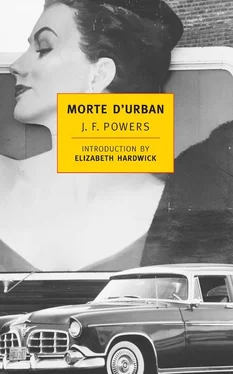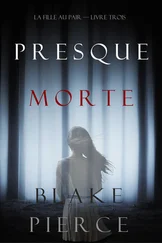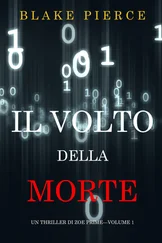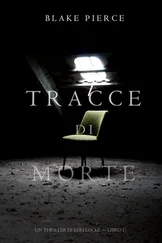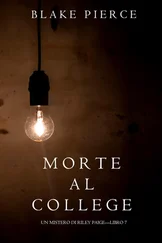“Let’s not talk about it now,” Sally said.
“All right,” said Father Urban. He wouldn’t push her. He’d made a start. She had said “now” in such a way that it could mean “later.”
Sally got up and brought the decanter over to the fire.
“No, I’ve had enough,” Father Urban said. “And whenever you’re ready, we’d better go.”
She poured a little into her glass. “Sure you wouldn’t like to hear the phonograph?” She had suggested this earlier.
“Not particularly.”
“I have some lovely old fox trots.”
“‘Hello, Aloha,’” he said to himself.
“No, not that one. I remember it, though. Is it one of your favorites?”
“No.” Father Urban listened to the big trees blowing on the mainland. They were dropping their leaves. On the island, there were only small needle-bearing trees, and they made an indistinct whirring noise. He could hear the water better. He wondered where the station wagon was.
“Then how about a swim?”
Father Urban laughed. “You’re psychic, Sally. All right, just a drop,” he said, holding out his glass, and then he gave her an account of his fishing trip — suppressing only his suspicions about Billy and Honey, and the part about the station wagon. In the end, though, he told her about the station wagon.
“Then the big one did get away?”
“You might say that. But maybe it would’ve happened anyway — sooner or later. There are some relationships that won’t hold up.”
“Because they’re all wrong.”
“This one wasn’t all wrong. I blame myself, in a way. Billy wasn’t ready for anything like that, from me. That was partly my fault. But if he comes around — and that’s not entirely out of the question — our relationship will be different. Better. From what I know of him, though, I don’t think he’ll come around.”
“And Mother — do you think she’ll come around?”
“You know, when you think about it, that was really the same kind of a deal. She wasn’t ready. That was partly my fault.”
“You didn’t enjoy the brute’s company, did you? Tell the truth.”
“Billy’s company? Not particularly. He has a cruel streak.”
“Or Mother’s company?”
“No, to tell you the truth, I didn’t.”
“Do you enjoy my company?”
“As a matter of fact, I do.”
“But that isn’t why you’re here, is it?”
“No, not exactly. I don’t feel it should be, do you?”
Sally didn’t reply to the question. “You say you’re always disappointed by people who’re trying to go it alone.”
“Not by the people themselves but by their reasons.”
“Has it occurred to you that people might be disappointed by you and your reasons, and even more by you?”
“I’m not sure I know what you mean,” said Father Urban.
“I mean you’re an operator — a trained operator like Mrs Leeson, and an operator in your heart — and I don’t think you have a friend in the world.”
Father Urban smiled. “Now you’ve gone too far.”
“Name one .”
Father Urban was silent, thinking was there no one he could call his friend? Father Louis? Jack? Monsignor Renton? They were the best he could do, and he could not call one of them his friend — not as Sally was using the word. They all had their shortcomings, though perhaps, as Sally said, the trouble was really in him. He held them off. However, in view of the warnings in Scripture against allowing terrestrial relationships to interfere with one’s apostolic work, he wondered if he might not be justified — in not having a friend in the world? “You may be right,” he said. “The truth is I’ve traveled too much, and been too busy, to maintain the kind of friendship you’re talking about.”
“Busy with Billy, busy with Mother — and busy with me.”
“No, this has been fun, but I do think we should be going.”
They didn’t go, and Father Urban, while Sally played the phonograph, just sat there, sipping scotch and seeing himself as he might have been — in some kind of business you could breathe in, perhaps heavy machinery, much of it going overseas, lots of travel, meeting fellows like Haile Selassie and Farouk’s father, whatever his name was, and operating out of a spacious office on Michigan Avenue, high up, with a view of the lake, walnut paneling, Persian carpets, furnished with gifts from potentates and dictators of the better sort, a tree at Christmas, efficient rosy-cheeked girls in white-collared dark dresses, Irish girls hired for the purity of their vocables, and himself hardly ever there. He would have helped the girls with their grave personal problems, and they would be loyal to him and his firm forever, and never marry, and he would have put the crippled son of one of the elevator operators through school. Armour Institute of Technology, which, it occurred to him, was no longer in existence. M.I.T. then, and sent the company plane for him at Christmas. Until his marriage, he’d played around a lot, but he’d never touched waitresses, stewardesses, receptionists, the wives or mistresses of his friends, or anybody who worked for him in the office, in the home office, or in any of his other offices throughout the world. Or — if he had offices, he’d have plants — in any of his plants throughout the world. He had been pretty free and easy with women, it was true, but he’d always been fair. His life hadn’t been quite right, though — he’d known it all along — and so he’d fixed that. He’d married late, but not too late. Always partial to mature women, he’d married a widow. Lovely woman. Not beef and not pork but woman. Her throat not as full as it had been, perhaps, but otherwise she was good as new, nose and mouth finely drawn, arabesque lines, eyes dark, hair plentiful, tufty (as with some birds), and mahogany, light for mahogany, expressive hands, holding whatever they held lightly… lovely woman whose first marriage, if you could call it that, hadn’t clicked. In fact, there would have been a divorce if he, a wheat broker, hadn’t been killed in a freak accident. Lost his footing and fell into a silo — inspecting it for rats — and before help came, suffocated. Wheat closed over his head. What a way to go. Same thing — this time a workman — in the news again last week. Where were the safety engineers? During the football season, the widow and her new husband came to the Belleisle Inn, arriving with their golden calf luggage, white stitching, a night or two before the games. Big Ten. Evanston, Ann Arbor, or Madison. Nice place, the Belleisle, fireplace in every room. Out of the night, the orange and black night, the sound of the wind reached him, and the noise of dating, the squeal of tires cornering, the rock ’em— sock ’em lineplay in the back seats, and baa, baa, baa from fraternity houses. No, he hadn’t gone East (his wife’s brother was Harvard) because he hadn’t had the dough for it, or even the inclination. Northwestern, Wisconsin, or Chicago (once a power in the Conference, the Maroons), one of those places. No table-waiting for him. He went first class, as a gladiator. A little light by present-day standards, but who wasn’t then? Fleet halfback, and did all the kicking. What ever happened to the dropkick? Also lettered in basketball and baseball. No time for track. No hockey, it wasn’t played. Not an athletic bum. History major. Stood him in good stead later on in life, at dinner tables throughout the world, the old world any-way. Evening, ma’am. Winston. Aristotle. The wind seems to be changing. An amateur in the lost sense of the word. His one book (one’s enough), a by-product of road trips with the varsity, jotted down in hotel lobbies while waiting for the elevator, but still highly regarded by those who’d spent their whole lives in the field, and soon to be reissued in a quality paperback for which there might be a large public, perhaps a very large public. All royalties from When Saints Were Bold would go to his wife’s charities. Visiting Nurse Association. Junior League. He had no children, so far as he knew, and his wife had none by her first marriage. No regrets. The world was no place for children nowadays. But every summer he sent poor kids to camp, sometimes by station wagon driven by his man Friday, and sometimes on the Empire Builder. Camp Wil-Frid-Bes-Tud-Ik, up in Minnesota, land of sky-blue waters. Non-sectarian camp. Own religious interest? None. Raised a Roman Catholic, he espoused no religion now, but didn’t make one of that . He had got away, he hadn’t fallen away, from the faith of his fathers. Was that Andrew Thwaites, Mr Studley? Indeed it was, son, and he likes your style. He could do a lot for you. There’s just one thing… But he still went to Mass whenever he was in Rome or Paris, which was a source of consolation and hope to a certain Father Gabriel and a dozen scholarly Jesuits. Some of his best friends were Catholics with a cruel streak in them. He didn’t associate with people if he didn’t enjoy their company. He wouldn’t do business with people he didn’t like. He knew people in all walks of life, and was well liked, but too much of a loner to have close friends. He traveled around too much, and was, despite appearances to the contrary, too busy. Oh, high-level stuff. Next week, Ghana. Allis-Chalmers the only danger there. GE in Turkey. Big place, Africa. Room for all, white and black. Egypt, seat of ancient civilization, nicer before Nasser, himself nice enough. Lots of poverty, of course. Europe much the same again. Your best hotels and restaurants are good the world over, and were before Hilton. Tito not a bad guy when you get to know him — his real name’s Broz. Communist? Well, it depends what you mean. You have to define your terms. Wonderful food. Iron Curtain, Mrs Bean? I didn’t find it so. Not a-tall. Sent an old trench coat to the cleaners and it came back good as new. There right after Premier Stalin passed away. Malenkov. Too bad. Nice to meet a Russian doesn’t look like a streetcar conductor on the Milwaukee Avenue run. Shrapnel Brothers? Never heard of ’em, but I’ll ask my barber about the publication. Recreations: sports cars, history, golf, people. A bit of fluff, yes, but don’t put that down. Except for occasional headaches, in perfect health. No, born downstate, land of Lincoln, but consider Chicago my home. New York? All right, if you happen to be a waiter or a cab driver. I don’t. No Michigan Avenue and no lake and the whole place has a bombed look. Give me Chicago. The most beautiful sound I know is the sound of whistles on Michigan Avenue at dusk, especially in the fall. I like to sit in Grant Park and listen to the cops calling to each other like nightingales. You know the Chicago whistle? Wheeeeeeeeeeeeuhhhhhhhwheeeeeuhhhh . I’d say it’s a musical instrument, related to the clarinet, piccolo, and oboe, and also related to the old-time train whistle. It’d scare the hell out of you — rightly played, that is — if you didn’t see the lights and the people and the Wrigley Building. I like to see Michigan Avenue shining wet at night. I like to come out of the Blackstone or the Drake at dusk, especially in the fall, with two or three good ones in me, and hear those whistles, the mush and the whine of rubber, the distant roar — it always seems to be centered over LaSalle Street, to the south, but it’s like a haze you can see and never touch. For many years I traveled out of Chicago, and I’m proud to call it my home. Expect from life? Only what any sane person would expect. What I’ve had from it. I’ve written my book, I’ve married my wife, I’ve made my pile. No complaints, no regrets. Who could ask for anything more?
Читать дальше
